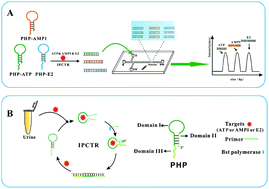Multiplex detection of quality indicator molecule targets in urine using programmable hairpin probes based on a simple double-T type microchip electrophoresis platform and isothermal polymerase-catalyzed target recycling†
Abstract
Recently, it has been crucial to be able to detect and quantify small molecular targets simultaneously in biological samples. Herein, a simple and conventional double-T type microchip electrophoresis (MCE) based platform for the multiplex detection of quality indicator molecule targets in urine, using ampicillin (AMPI), adenosine triphosphate (ATP) and estradiol (E2) as models, was developed. Several programmable hairpin probes (PHPs) were designed for detecting different targets and triggering isothermal polymerase-catalyzed target recycling (IPCTR) for signal amplification. Based on the target-responsive aptamer structure of PHP (Domain I), target recognition can induce PHP conformational transition and produce extension duplex DNA (dsDNA), assisted by primers & Bst polymerase. Afterwards, the target can be displaced to react with another PHP and initiate the next cycle. After several rounds of reaction, the dsDNA can be produced in large amounts by IPCTR. Three targets can be simultaneously converted to dsDNA fragments with different lengths, which can be separated and detected using MCE. Thus, a simple double-T type MCE based platform was successfully built for the homogeneous detection of multiplex targets in one channel. Under optimal conditions, the assay exhibited high throughput (48 samples per hour at most, not including reaction time) and sensitivity to three targets in urine with a detection limit of 1 nM (ATP), 0.05 nM (AMPI) and 0.1 nM (E2) respectively. The multiplex assay was successfully employed for the above three targets in several urine samples and combined the advantages of the high specificity of programmable hairpin probes, the excellent signal amplification of IPCTR, and the high through-put of MCE which can be employed for screening in biochemical analysis.



 Please wait while we load your content...
Please wait while we load your content...